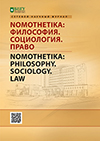The formation of a positive ethnic identity in a mono-ethnic region
DOI:
https://doi.org/10.18413/2712-746X-2020-45-2-237-246Keywords:
ethnos, national culture, ethnic tolerance, ethnic identity, mono-ethnic region, inter-ethnic interaction, tolerance, social identification, ethnic processes, migrationAbstract
On the basis of sociological research there was analyzed the level of ethnic tolerance and the type of ethnic identification in the mono-ethnic region. The authors revealed the essence of the concept «ethnic tolerance» and «ethnic identification». After analyzing the types of ethnic identification, the authors concluded that positive ethnic identification affects ethnic tolerance and negative identification provokes intolerance. Also there is given a classification of regions by their ethnicity. The authors convincingly prove that the mono-ethnic regions are experiencing problems in inter-ethnic interaction in modern conditions. Based on the findings, the authors developed measures for the formation of a positive ethnic identity. These measures describe the possibilities of a wide range of actors of inter-ethnic interaction in this process. The role of national associations in broadcasting their culture in a non-ethnic environment and the role of this process in the formation of a positive ethnic identity of the host community is emphasized. Recommendations are also given for the authorities and civil society involved in this process. The article is of interest to a wide range of researchers.
Downloads
References
Буфетова А.Н., Коломак Е.А. 2017. Национальная неоднородность в регионах России. ЭКО, 47(4): 110–123.
Ершова Н.Н., Мурсатова Н.Ю. 2018. Структура социальной идентичности у студентов. В кн.: Инновационные технологии в науке и образовании. Сборник статей VI Международной научно-практической конференции (Пенза, 5 ноября 2017 г.). Пенза, Наука и Просвещение: 198–200.
Зуйкова А.А. 2019. Особенности этнической идентичности, связь с самооценкой личности. Человек. Социум. Общество, 3: 57–60.
Карпенко З.Р. 2018. Типы формирования этнической идентичности. В кн.: Реализация компетентностного подхода в системе профессионального образования педагога. Материалы V Всероссийской научно-практической конференции (Евпатория, 12–13 апреля 2018 г.). Симферополь, Общество с ограниченной ответственностью «Издательство Типография «Ариал»: 78–80.
Коряпина Ю.В.2011. К вопросу о когнитивном компоненте коммуникативной толерантности. Знание. Понимание. Умение, 2: 270–273.
Попов В.В. 2008. Этническая толерантность и методы определения границ толерантного отношения. В сб.: Материалы III Всероссийского социологического конгресса (Москва 21–24 октября 2008 г.). М., Институт социологии РАН, Российское общество социологов: 215–219.
Сафонов С.Г. 2015. Современные тенденции трансформации этнического состава населения России. Балтийский регион, 3(25): 138–153.
Семина Г.В. 2018. Этносы и нации: к вопросу об этничности (идентичности) в научных традициях отечественных и западных исследователей. Вопросы культурологи, 6: 10–19.
Скоробогатая А.А. 2008. Этническая идентичность и межкультурное взаимодействие в Северной Башкирии. М., ТЕИС: 190.
Солдатова Г.У., Чигарькова С.В. 2016. Позитивная этническая идентичность как фактор успешного межкультурного взаимодействия. В кн.: Россия в мировом сообществе: смысловое пространство диалога культур. Материалы международного форума «Восточный вектор миграционных процессов: диалог с русской культурой» (Хабаровск, 16–17 ноября 2017 г.). Хабаровск, Тихоокеанский государственный университет: 487–490.
Татарко А.Н., Лебедева Н.М. 2010. Психология межэтнических отношений: этническая идентичность и стратегии межкультурного взаимодействия. Saarbrucken, LAPLAMBERT Academic Publishing GmbH & Co: 177 с.
Тишков В.А. 1997. Толерантность и согласие в трансформирующихся обществах. М., Русский мир: 532 с.
Хотинец В.Ю. 2000. Этническое самосознание. СПб., Алетейя: 240 с.
Шатаева О.В., Коршунова Н.Е., Никитюк В.А. 2015. Этническая толерантность сотрудников организации г. Москвы. М, Прометей: 140 с.
Frants V. 2016. Ethnic identity as the migrants political identity element. In: AEON International Multidisciplinary Conference on Social Sciences and Arts (Venice, 30 September – 03 October, 2016). Venice, Aeon Eood: 10–17.
Goncharov V.N. 2016. Ethnic identity in the context of development of society and state. In: Ethnocultural identity as a strategic resource of consciousness of society in the conditions of globalization. Materials of the IV international scientific conference (Prague, September 28–29, 2016). Prague, Vedecko vydavatelske centrum Sociosfera-CZ s.r.o.: 28–30.
Goncharov V.N. 2017. Ethnic russian identity in the context of interethnic tolerance. In: Ethnocultural identity as a strategic resource of consciousness of society in the conditions of globalization. Materials of the V international scientific conference (Prague, 28–29 September, 2017). Prague, Vedecko vydavatelske centrum Sociosfera-CZ s.r.o.: 10–13.
Skvortsov N. 2017. The Formation of National Identity in Contemporary Russia. Changing Societies & Personalities. Special issue «Values: Continuities and Alterations», 1(1): 74–83.
Abstract views: 750
Share
Published
How to Cite
Issue
Section
Copyright (c) 2020 NOMOTHETIKA: Philosophy. Sociology. Law

This work is licensed under a Creative Commons Attribution 4.0 International License.


